新概念英语第二册 Lesson 39 Am I all right?讲义
文档属性
| 名称 | 新概念英语第二册 Lesson 39 Am I all right?讲义 | 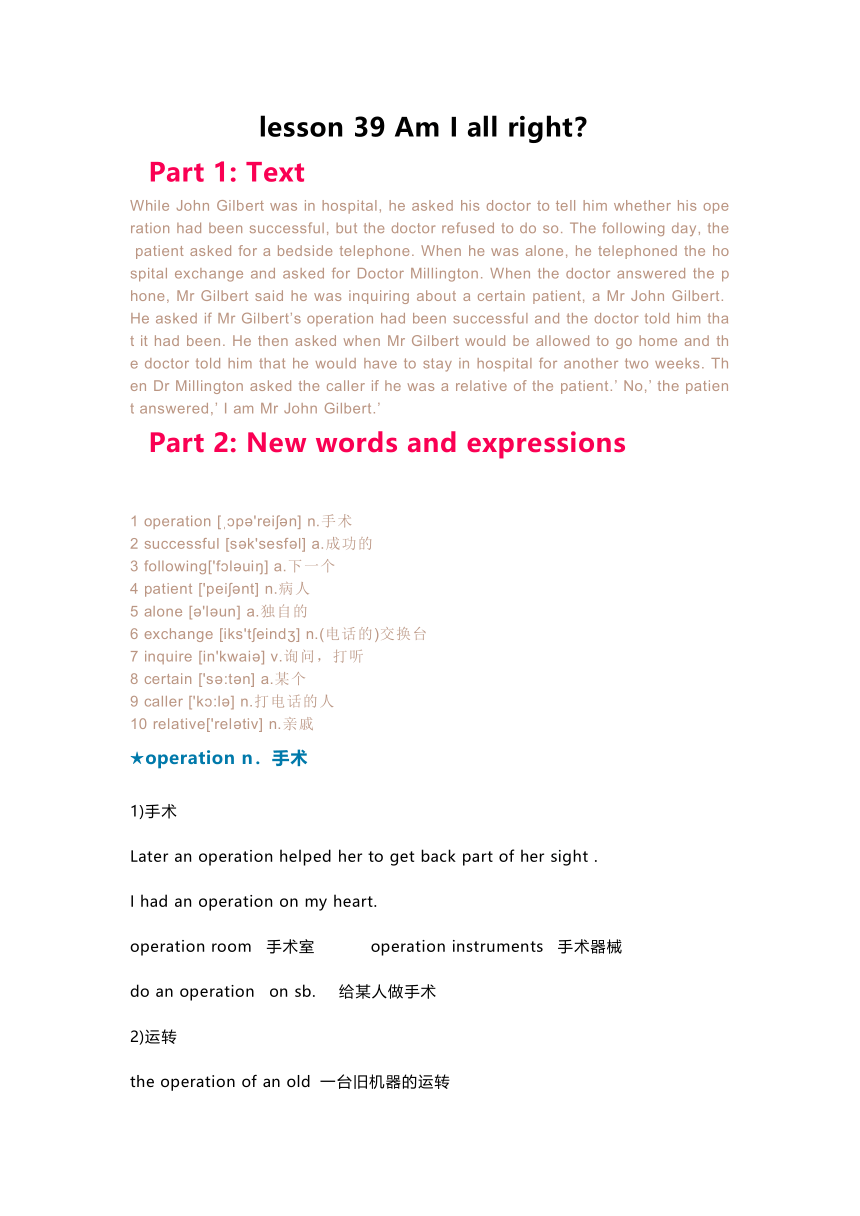 | |
| 格式 | docx | ||
| 文件大小 | 32.3KB | ||
| 资源类型 | 教案 | ||
| 版本资源 | 新概念英语 | ||
| 科目 | 英语 | ||
| 更新时间 | 2023-09-24 22:31:13 | ||
图片预览

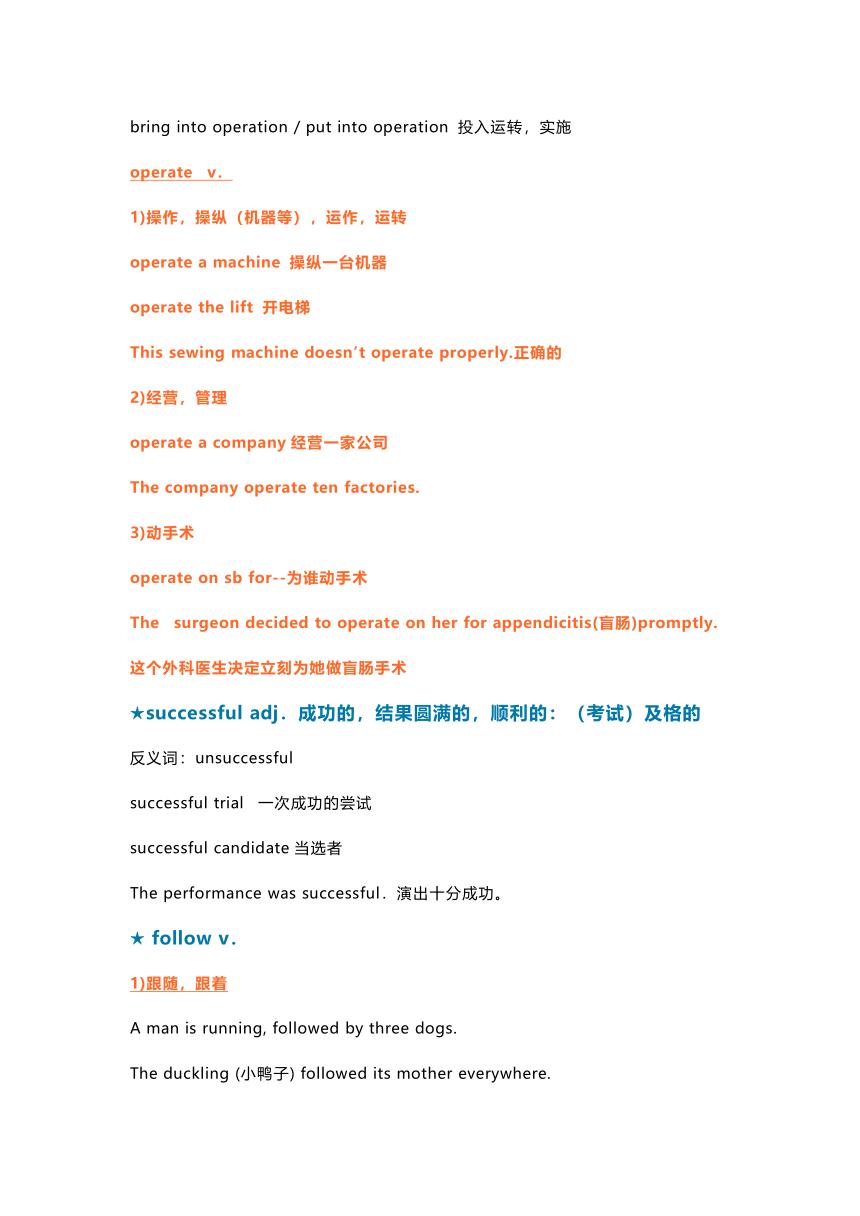
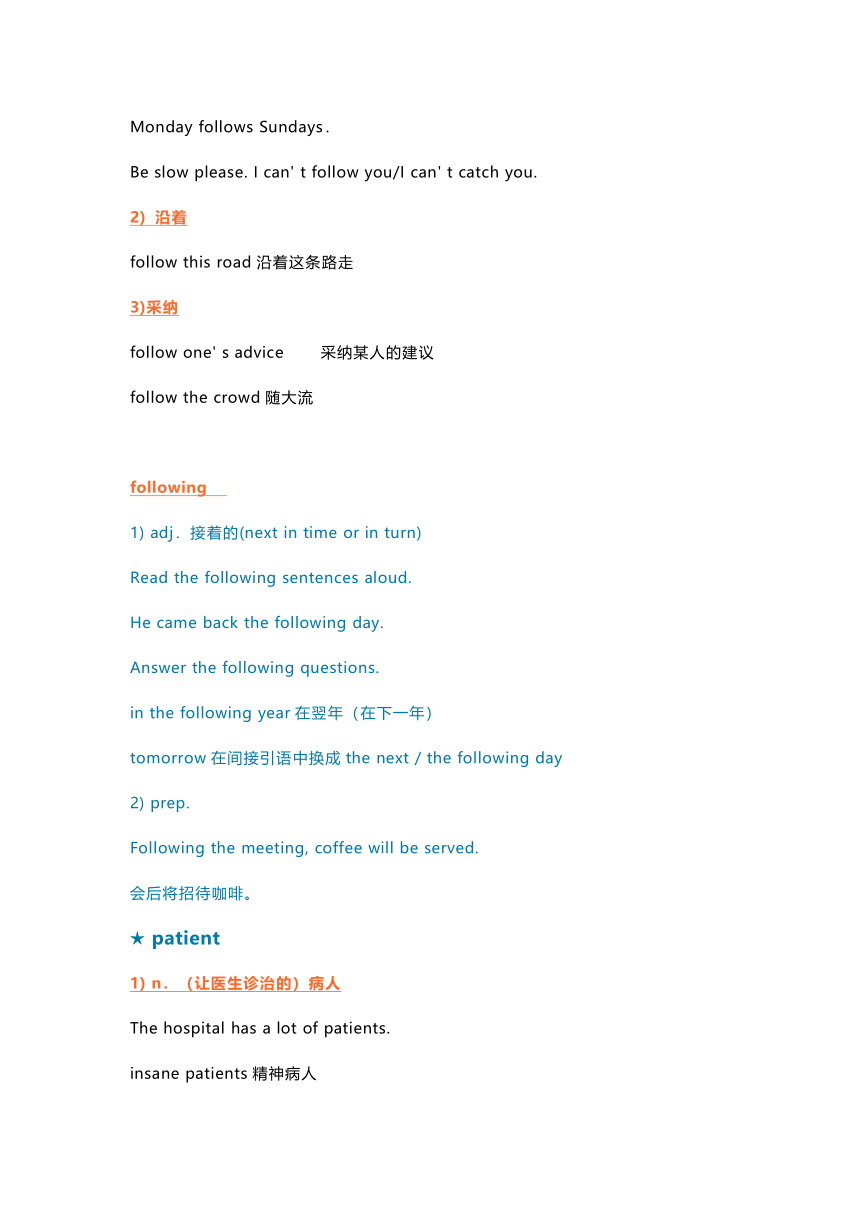
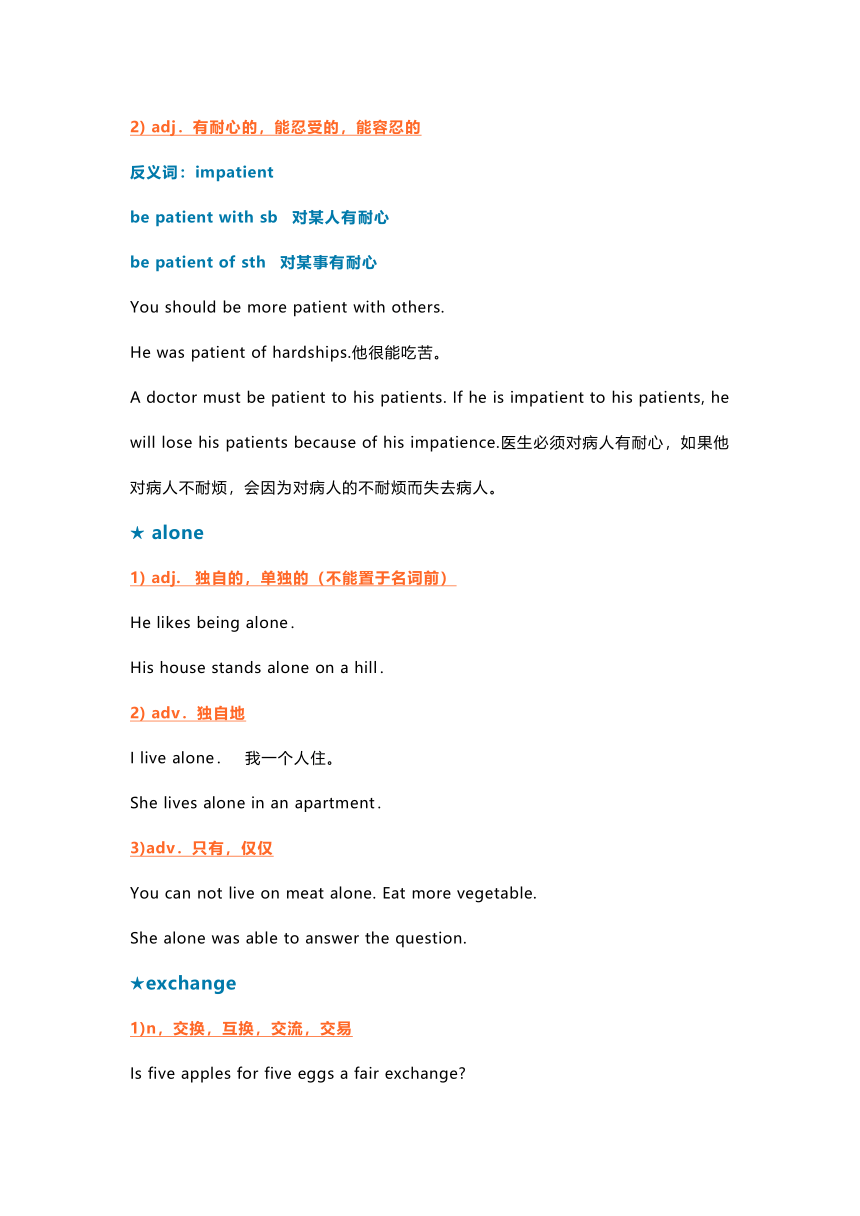
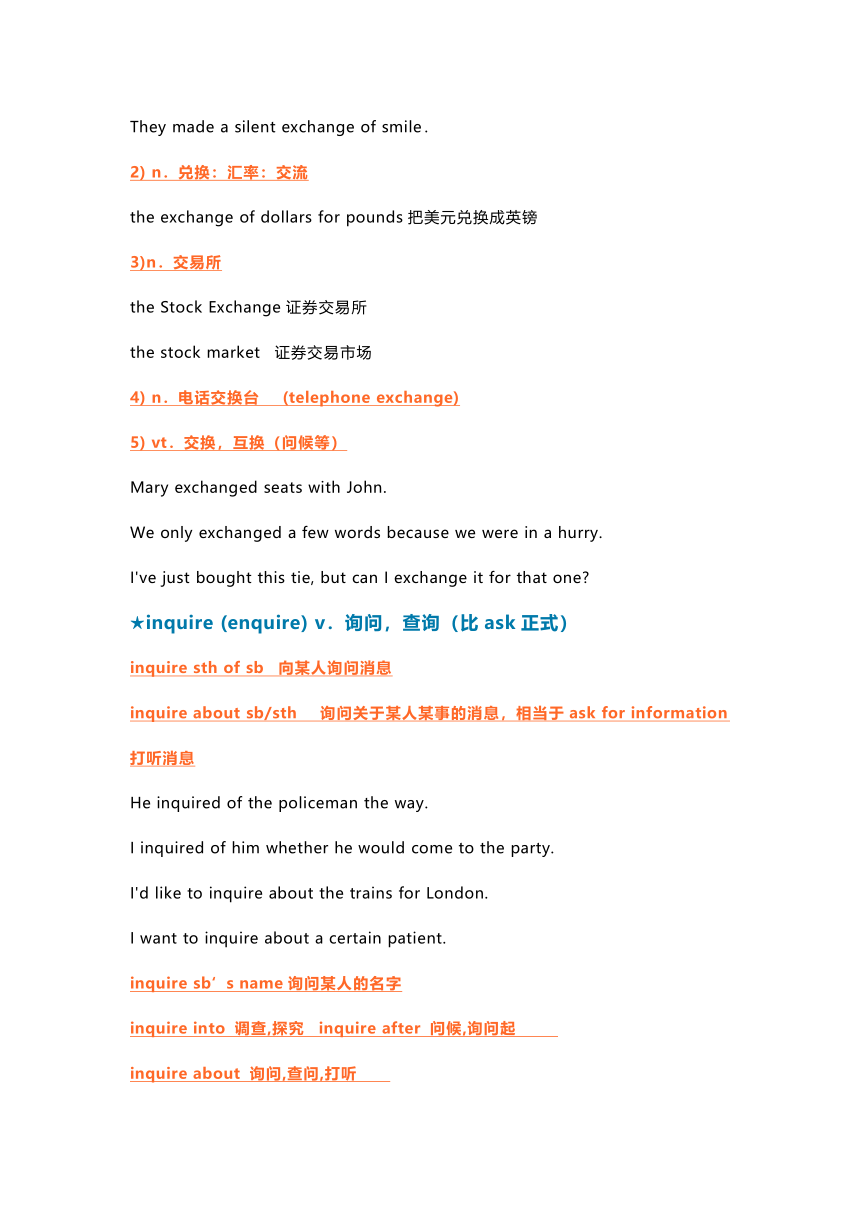
文档简介
lesson 39 Am I all right?
Part 1: Text
While John Gilbert was in hospital, he asked his doctor to tell him whether his operation had been successful, but the doctor refused to do so. The following day, the patient asked for a bedside telephone. When he was alone, he telephoned the hospital exchange and asked for Doctor Millington. When the doctor answered the phone, Mr Gilbert said he was inquiring about a certain patient, a Mr John Gilbert. He asked if Mr Gilbert’s operation had been successful and the doctor told him that it had been. He then asked when Mr Gilbert would be allowed to go home and the doctor told him that he would have to stay in hospital for another two weeks. Then Dr Millington asked the caller if he was a relative of the patient.’ No,’ the patient answered,’ I am Mr John Gilbert.’
Part 2: New words and expressions
1 operation [ p 'rei n] n.手术
2 successful [s k'sesf l] a.成功的
3 following['f l ui ] a.下一个
4 patient ['pei nt] n.病人
5 alone [ 'l un] a.独自的
6 exchange [iks't eind ] n.(电话的)交换台
7 inquire [in'kwai ] v.询问,打听
8 certain ['s :t n] a.某个
9 caller ['k :l ] n.打电话的人
10 relative['rel tiv] n.亲戚
★operation n.手术
1)手术
Later an operation helped her to get back part of her sight .
I had an operation on my heart.
operation room 手术室 operation instruments 手术器械
do an operation on sb. 给某人做手术
2)运转
the operation of an old 一台旧机器的运转
bring into operation / put into operation 投入运转,实施
operate v.
1)操作,操纵(机器等),运作,运转
operate a machine 操纵一台机器
operate the lift 开电梯
This sewing machine doesn‘t operate properly.正确的
2)经营,管理
operate a company经营一家公司
The company operate ten factories.
3)动手术
operate on sb for--为谁动手术
The surgeon decided to operate on her for appendicitis(盲肠)promptly.
这个外科医生决定立刻为她做盲肠手术
★successful adj.成功的,结果圆满的,顺利的:(考试)及格的
反义词:unsuccessful
successful trial 一次成功的尝试
successful candidate当选者
The performance was successful.演出十分成功。
★ follow v.
1)跟随,跟着
A man is running, followed by three dogs.
The duckling (小鸭子) followed its mother everywhere.
Monday follows Sundays.
Be slow please. I can' t follow you/I can' t catch you.
2) 沿着
follow this road沿着这条路走
3)采纳
follow one' s advice 采纳某人的建议
follow the crowd随大流
following
1) adj.接着的(next in time or in turn)
Read the following sentences aloud.
He came back the following day.
Answer the following questions.
in the following year在翌年(在下一年)
tomorrow在间接引语中换成the next / the following day
2) prep.
Following the meeting, coffee will be served.
会后将招待咖啡。
★ patient
1) n.(让医生诊治的)病人
The hospital has a lot of patients.
insane patients精神病人
2) adj.有耐心的,能忍受的,能容忍的
反义词:impatient
be patient with sb 对某人有耐心
be patient of sth 对某事有耐心
You should be more patient with others.
He was patient of hardships.他很能吃苦。
A doctor must be patient to his patients. If he is impatient to his patients, he will lose his patients because of his impatience.医生必须对病人有耐心,如果他对病人不耐烦,会因为对病人的不耐烦而失去病人。
★ alone
1) adj. 独自的,单独的(不能置于名词前)
He likes being alone.
His house stands alone on a hill.
2) adv.独自地
I live alone. 我一个人住。
She lives alone in an apartment.
3)adv.只有,仅仅
You can not live on meat alone. Eat more vegetable.
She alone was able to answer the question.
★exchange
1)n,交换,互换,交流,交易
Is five apples for five eggs a fair exchange
They made a silent exchange of smile.
2) n.兑换:汇率:交流
the exchange of dollars for pounds把美元兑换成英镑
3)n.交易所
the Stock Exchange证券交易所
the stock market 证券交易市场
4) n.电话交换台 (telephone exchange)
5) vt.交换,互换(问候等)
Mary exchanged seats with John.
We only exchanged a few words because we were in a hurry.
I've just bought this tie, but can I exchange it for that one
★inquire (enquire) v.询问,查询(比ask正式)
inquire sth of sb 向某人询问消息
inquire about sb/sth 询问关于某人某事的消息,相当于ask for information打听消息
He inquired of the policeman the way.
I inquired of him whether he would come to the party.
I'd like to inquire about the trains for London.
I want to inquire about a certain patient.
inquire sb‘ s name询问某人的名字
inquire into 调查,探究 inquire after 问候,询问起
inquire about 询问,查问,打听
inquire of 询问,打听
inquire for 求见,要找
★certain
1) adj.确定的,有把握的,常可与sure通用They are sure to be late==They are certain to be late. I'm sure that they'll be late==l' m certain that they'll be late.One thing is sure; they'll be late. One thing is certain: they' ll be late.certain的语气比sure强,当it做主语,只用certain。It is certain that they'll be late.2) adj.(未指明真实名称)某一个,(说出名称但不很熟悉的)某一个,一位姓…的人,置于名词前。A certain Mr. Brown called while you were out.For certain reasons, I'll be absent for the meeting.some修饰单数可数名词,表示“某个”Some man tit the door is asking it see you. for some reason / for a certain reason 由于某种原因。
★caller n.打电话的人
call v.
1)叫,喊
2)call out to sb for sth向某人大声喊叫
He called out to her. 他大声的喊她。
call the roll 点名
call your name 叫你的名字
3)给…取名
call the baby Sophia 管这个小孩叫索菲亚
call at 拜访 call on 拜访(某人)
call off 取消
The game was called off because of the rain.
call box/telephone booth/telephone box公共电话亭
★relative n.亲戚,亲属
a close relative /a near relative近亲
a distant relative 远亲
relation n.亲戚:关系
Relationship n. 关系 关联
Part 3: Notes on the text
★While John Gilbert was in hospital, he asked his doctor to tell him whether his operation had been successful, but the doctor refused to do so
1.while conj.
1)当…时候,和…同时,只要
He took d bath while I was preparing dinner.准备饭
2)当while所引导的从句与主句主语相同,且while从句的动词为be时,while从句的主语和be动词有时被省略。
He watched TV while he was eating.
3)虽然,然而,另一方面
I earn only 50 dollars a week, while she earns 80 dollars.
我每周只挣50美元而她每周挣80美元。
2.in hospital 住院 in the hospital 在医院(表示方位)
be at school 在课堂上,在求学 be at the school 在学校
3.ask sb to do sth 让某人做某事ask for sth/sb 要求要
4.refuse to do sth 拒绝做某事He refused to help me.
so 代词,代替前面的动词不定式 to tell him whether…
★The following day, the patient asked for a bedside telephone. when
he was alone he telephoned the hospital exchange and asked Tor DotorMillington.
1. the following day /the next day第二天
2. bedside
1)adj.床边的枕边的
床头柜bedside table
床头灯bedside lamp
2)n.床边
when he was alone 相当于
when he was on his own 当他一个人的时候
★When the doctor answered the phone, Mr. Gilbert said he was inquiring about a certain patient, a Mr. John Gilbert.
answer the phone 接电话
answer a letter 回信
answer a question 回答一个问题
answer sb. 回答某人
★He asked if Mr. Gilbert's operation had been successful and the doctor told him that it had been.
Was Mr. Gilbert's operation successful
Yes, it was.
将原句转化就成了句中的间接引语了。
★He then asked when Mr. Gilbert would be allowed to go home and the doctor told him that he would have to stay in hospital for another two weeks.
when引导一个宾语从句,that引导一个宾语从句
两个宾语从句,还原为直接引语:
'When will Mr. Gilbert be allowed to go home ' he asked.
'He will have to stay in hospital for another two weeks. 'the doctor said.
would be allowed过去将来时被动语态
another adj.:另一个,类似的,别的
another two weeks另外两星期
★Then Dr. Millington asked the caller if he was a relative of the Patient. 'No.' the patient answered, 'I am Mr. John Gilbert.'
原句:
Then Dr. Millington asked, "Are you a relative of the patient "
注意,去掉引号变成间接引语
Part 4: Grammar&Difficult points
直接引语变间接引语
1、人称的转变
1)直接引语中的第一人称一般转换为第三人称
如:He said,“I am very sorry.”
——>He said that he was very sorry.
2)直接引语中的第二人称,如果原话是针对转述人说的,转换为第一人称
如:“You should be more careful next time,” my father told me.
——> My father told me that I should be more careful the next time.
3)直接引语中的第二人称,如果原话是针对第三人称说的,转换成第三人称。
如:She said to her son, “I'll check your homework tonight.”
——> She said to her son that she would check his homework that night.
4)人称的转换包括人称代词、物主代词和名词性物主代词等,
如:He asked me, “Will you go to the station with me to meet a friend of mine this afternoon ”
——> He asked me whether I would go to the station with him to meet a friend of his that afternoon.
总之,人称的转换不是固定的,具体情况,具体对待,要符合逻辑。
2.时态的转换 直接引语改为间接引语时,主句中的谓语动词如果是过去时,从句(即间接引语部分)的谓语动词在时态方面要作相应的变化,变成过去时范畴的各种时态(实际也是宾语从句的时态要求),变化如下:
3、直接引语变成间接引语时,从句时态无须改变的情况
1)当主句的谓语动词是一般现在时的时候,
如:He always says, “I am tired out.”
——>He always says that he is tired out.
2)当主句的谓语动词是将来时的时候,
如:He will say, “I’ll try my best to help you.”
——>He will say that he will try his best to help me.
3)当直接引语部分带有具体的过去时间状语时
如:He said, “I went to college in 1994.”
——>He told us that he went to college in 1994
4)当直接引语中有以when, while引导的从句,表示过去的时间时,
如:He said,“When I was a child, I usually played football after school.”
——> He said that when he was a child, he usually played football after school.
5)当直接引语是客观真理或自然现象时,
如:Our teacher said to us, “Light travels faster than sound.”
——> Our teacher told us that light travels faster than sound.
6)当引语是谚语、格言时,
如:He said,“Practice makes perfect.” ——>He said that practice makes perfect.
7)当直接引语中有情态动词should, would, could, had better, might, must, used to, need时
如:She asked, “Must I take the medicine ”
——> She asked if she had to take the medicine.
〔注〕:此处用had to代替must更好 )此外转述中的变化要因实际情况而定,不能机械照搬,如果当地转述,here不必改为there, 动词come不必改为go,如果当天转述yesterday, tomorrow, this afternoon等均不必改变。
4、时间状语、地点状语及某些对比性的指示代词和动词变化
1)时间状语:
直接引语 (间接引语)
now (then);
today (that day);
tomorrow (the next / following day )
next week (the next / following week)
yesterday (the day before)
two days ago(two days before )
this week/month/year (that week/month/ year)
2)指示代词:these 变成those
3)地点状语:here变成there
She said, “I won't come here any more.”
——> She said that she wouldn’t go there any more.
4)动词:come变成go,bring变成take
5、直接引语变间接引语,句子结构的变化
1)陈述句。用连词that引导,that在口语中常省略。主句的谓语动词可直用接引语中的said, 也可用told来代替,注意,可以说said that, said to sb. that, told sb. that,不可直接说told that,
如:He said, “I have been to the Great Wall.”
——>He said to us that he had been to the Great Wall.
He said, “I'll give you an examination next Monday.”
——> He told us that he would give us an examination the next Monday.(不可说told that)
2)直接引语为一般疑问句,(也称是否疑问句,)间接引语用连词whether或if引导,原主句中谓语动词said要改为asked(me/him/us等),语序是陈述句的语序,这一点非常重要。
如:He said, “Do you have any difficulty with pronunciation ”
——>He asked(me)whether/if I had any difficulty with my pronunciation.
3) 直接引语为选择疑问句,间接引语用whether…or…表达,而不用if…or…,也不用either…or….
如:He asked, “Do you speak English or French ”
——> He asked me whether I spoke English or French.
4)直接引语为特殊疑问句,改成间接引语时,原来的疑问词作为间接引语的连词,主句的谓语动词用ask(sb.)来表达,语序改为陈述句语序。
如:He asked,“What's your name ”
——> He asked(me)what my name was.
5)直接引语为祈使句时,改为间接引语,用带to的不定式表达,谓语动词常是ask, advise, tell, warn, order, request等。如ask sb. to do,(由肯定祈使句变成)ask sb. not to do(由否定祈使句转变),并且在不定式短语中的时间状语、地点状语、人称及时态都作相应的变化。
如:He said,“Be seated, please.”
——> He asked us to be seated.
6)有些含有“建议”——>、“劝告”——>的祈使句,可用suggest, insist, offer等动词转述,
如:He said, “Let's have a rest.”
——> He suggested our having a rest
7)当直接引语形式上是疑问句,有表示请求,建议意义时,可用ask sb. to do sth. /suggest doing/advise sb. to do sth. 等形式转述。
如:“Would you mind opening the door ” he asked.
——>He asked me to open the door.
8)直接引语是感叹句时,变间接引语可用what或how引导,也可用that引导,
如:She said, “What a lovely day it is!”
——> She said what a lovely day it was.
或She said that it was a lovely day .
改写句子
1) The secretary asked "What's your occupation
秘书问道,你是做什么职业的
The secretary asked what my occupation was.
2) He asked :" Where are you to get off, John "
他问John你要在哪下车呢?
He asked John where he was get off.
3) He asked:' 'How are you' getting along "
他问你们相处的怎么样啊?
He asked us how we getting along
4) He asked: "Are you sure your mother will come "
他问道你确信你的母亲会来吗?
He asked me whether I was sure my mother would come.
5) He asked :"Are you a teacher or a student "
“他问道,你是老师还是学生呢?
He asked me whether I was a teacher or a student
6) "You've already got well. haven't you " she asked.
她问你已经好了,是吗?
She asked whether I had already got well.
Part 5: Homework
1.背诵lesson 39单词&课文
2.Retell the text
3.练习总结课文
Part 1: Text
While John Gilbert was in hospital, he asked his doctor to tell him whether his operation had been successful, but the doctor refused to do so. The following day, the patient asked for a bedside telephone. When he was alone, he telephoned the hospital exchange and asked for Doctor Millington. When the doctor answered the phone, Mr Gilbert said he was inquiring about a certain patient, a Mr John Gilbert. He asked if Mr Gilbert’s operation had been successful and the doctor told him that it had been. He then asked when Mr Gilbert would be allowed to go home and the doctor told him that he would have to stay in hospital for another two weeks. Then Dr Millington asked the caller if he was a relative of the patient.’ No,’ the patient answered,’ I am Mr John Gilbert.’
Part 2: New words and expressions
1 operation [ p 'rei n] n.手术
2 successful [s k'sesf l] a.成功的
3 following['f l ui ] a.下一个
4 patient ['pei nt] n.病人
5 alone [ 'l un] a.独自的
6 exchange [iks't eind ] n.(电话的)交换台
7 inquire [in'kwai ] v.询问,打听
8 certain ['s :t n] a.某个
9 caller ['k :l ] n.打电话的人
10 relative['rel tiv] n.亲戚
★operation n.手术
1)手术
Later an operation helped her to get back part of her sight .
I had an operation on my heart.
operation room 手术室 operation instruments 手术器械
do an operation on sb. 给某人做手术
2)运转
the operation of an old 一台旧机器的运转
bring into operation / put into operation 投入运转,实施
operate v.
1)操作,操纵(机器等),运作,运转
operate a machine 操纵一台机器
operate the lift 开电梯
This sewing machine doesn‘t operate properly.正确的
2)经营,管理
operate a company经营一家公司
The company operate ten factories.
3)动手术
operate on sb for--为谁动手术
The surgeon decided to operate on her for appendicitis(盲肠)promptly.
这个外科医生决定立刻为她做盲肠手术
★successful adj.成功的,结果圆满的,顺利的:(考试)及格的
反义词:unsuccessful
successful trial 一次成功的尝试
successful candidate当选者
The performance was successful.演出十分成功。
★ follow v.
1)跟随,跟着
A man is running, followed by three dogs.
The duckling (小鸭子) followed its mother everywhere.
Monday follows Sundays.
Be slow please. I can' t follow you/I can' t catch you.
2) 沿着
follow this road沿着这条路走
3)采纳
follow one' s advice 采纳某人的建议
follow the crowd随大流
following
1) adj.接着的(next in time or in turn)
Read the following sentences aloud.
He came back the following day.
Answer the following questions.
in the following year在翌年(在下一年)
tomorrow在间接引语中换成the next / the following day
2) prep.
Following the meeting, coffee will be served.
会后将招待咖啡。
★ patient
1) n.(让医生诊治的)病人
The hospital has a lot of patients.
insane patients精神病人
2) adj.有耐心的,能忍受的,能容忍的
反义词:impatient
be patient with sb 对某人有耐心
be patient of sth 对某事有耐心
You should be more patient with others.
He was patient of hardships.他很能吃苦。
A doctor must be patient to his patients. If he is impatient to his patients, he will lose his patients because of his impatience.医生必须对病人有耐心,如果他对病人不耐烦,会因为对病人的不耐烦而失去病人。
★ alone
1) adj. 独自的,单独的(不能置于名词前)
He likes being alone.
His house stands alone on a hill.
2) adv.独自地
I live alone. 我一个人住。
She lives alone in an apartment.
3)adv.只有,仅仅
You can not live on meat alone. Eat more vegetable.
She alone was able to answer the question.
★exchange
1)n,交换,互换,交流,交易
Is five apples for five eggs a fair exchange
They made a silent exchange of smile.
2) n.兑换:汇率:交流
the exchange of dollars for pounds把美元兑换成英镑
3)n.交易所
the Stock Exchange证券交易所
the stock market 证券交易市场
4) n.电话交换台 (telephone exchange)
5) vt.交换,互换(问候等)
Mary exchanged seats with John.
We only exchanged a few words because we were in a hurry.
I've just bought this tie, but can I exchange it for that one
★inquire (enquire) v.询问,查询(比ask正式)
inquire sth of sb 向某人询问消息
inquire about sb/sth 询问关于某人某事的消息,相当于ask for information打听消息
He inquired of the policeman the way.
I inquired of him whether he would come to the party.
I'd like to inquire about the trains for London.
I want to inquire about a certain patient.
inquire sb‘ s name询问某人的名字
inquire into 调查,探究 inquire after 问候,询问起
inquire about 询问,查问,打听
inquire of 询问,打听
inquire for 求见,要找
★certain
1) adj.确定的,有把握的,常可与sure通用They are sure to be late==They are certain to be late. I'm sure that they'll be late==l' m certain that they'll be late.One thing is sure; they'll be late. One thing is certain: they' ll be late.certain的语气比sure强,当it做主语,只用certain。It is certain that they'll be late.2) adj.(未指明真实名称)某一个,(说出名称但不很熟悉的)某一个,一位姓…的人,置于名词前。A certain Mr. Brown called while you were out.For certain reasons, I'll be absent for the meeting.some修饰单数可数名词,表示“某个”Some man tit the door is asking it see you. for some reason / for a certain reason 由于某种原因。
★caller n.打电话的人
call v.
1)叫,喊
2)call out to sb for sth向某人大声喊叫
He called out to her. 他大声的喊她。
call the roll 点名
call your name 叫你的名字
3)给…取名
call the baby Sophia 管这个小孩叫索菲亚
call at 拜访 call on 拜访(某人)
call off 取消
The game was called off because of the rain.
call box/telephone booth/telephone box公共电话亭
★relative n.亲戚,亲属
a close relative /a near relative近亲
a distant relative 远亲
relation n.亲戚:关系
Relationship n. 关系 关联
Part 3: Notes on the text
★While John Gilbert was in hospital, he asked his doctor to tell him whether his operation had been successful, but the doctor refused to do so
1.while conj.
1)当…时候,和…同时,只要
He took d bath while I was preparing dinner.准备饭
2)当while所引导的从句与主句主语相同,且while从句的动词为be时,while从句的主语和be动词有时被省略。
He watched TV while he was eating.
3)虽然,然而,另一方面
I earn only 50 dollars a week, while she earns 80 dollars.
我每周只挣50美元而她每周挣80美元。
2.in hospital 住院 in the hospital 在医院(表示方位)
be at school 在课堂上,在求学 be at the school 在学校
3.ask sb to do sth 让某人做某事ask for sth/sb 要求要
4.refuse to do sth 拒绝做某事He refused to help me.
so 代词,代替前面的动词不定式 to tell him whether…
★The following day, the patient asked for a bedside telephone. when
he was alone he telephoned the hospital exchange and asked Tor DotorMillington.
1. the following day /the next day第二天
2. bedside
1)adj.床边的枕边的
床头柜bedside table
床头灯bedside lamp
2)n.床边
when he was alone 相当于
when he was on his own 当他一个人的时候
★When the doctor answered the phone, Mr. Gilbert said he was inquiring about a certain patient, a Mr. John Gilbert.
answer the phone 接电话
answer a letter 回信
answer a question 回答一个问题
answer sb. 回答某人
★He asked if Mr. Gilbert's operation had been successful and the doctor told him that it had been.
Was Mr. Gilbert's operation successful
Yes, it was.
将原句转化就成了句中的间接引语了。
★He then asked when Mr. Gilbert would be allowed to go home and the doctor told him that he would have to stay in hospital for another two weeks.
when引导一个宾语从句,that引导一个宾语从句
两个宾语从句,还原为直接引语:
'When will Mr. Gilbert be allowed to go home ' he asked.
'He will have to stay in hospital for another two weeks. 'the doctor said.
would be allowed过去将来时被动语态
another adj.:另一个,类似的,别的
another two weeks另外两星期
★Then Dr. Millington asked the caller if he was a relative of the Patient. 'No.' the patient answered, 'I am Mr. John Gilbert.'
原句:
Then Dr. Millington asked, "Are you a relative of the patient "
注意,去掉引号变成间接引语
Part 4: Grammar&Difficult points
直接引语变间接引语
1、人称的转变
1)直接引语中的第一人称一般转换为第三人称
如:He said,“I am very sorry.”
——>He said that he was very sorry.
2)直接引语中的第二人称,如果原话是针对转述人说的,转换为第一人称
如:“You should be more careful next time,” my father told me.
——> My father told me that I should be more careful the next time.
3)直接引语中的第二人称,如果原话是针对第三人称说的,转换成第三人称。
如:She said to her son, “I'll check your homework tonight.”
——> She said to her son that she would check his homework that night.
4)人称的转换包括人称代词、物主代词和名词性物主代词等,
如:He asked me, “Will you go to the station with me to meet a friend of mine this afternoon ”
——> He asked me whether I would go to the station with him to meet a friend of his that afternoon.
总之,人称的转换不是固定的,具体情况,具体对待,要符合逻辑。
2.时态的转换 直接引语改为间接引语时,主句中的谓语动词如果是过去时,从句(即间接引语部分)的谓语动词在时态方面要作相应的变化,变成过去时范畴的各种时态(实际也是宾语从句的时态要求),变化如下:
3、直接引语变成间接引语时,从句时态无须改变的情况
1)当主句的谓语动词是一般现在时的时候,
如:He always says, “I am tired out.”
——>He always says that he is tired out.
2)当主句的谓语动词是将来时的时候,
如:He will say, “I’ll try my best to help you.”
——>He will say that he will try his best to help me.
3)当直接引语部分带有具体的过去时间状语时
如:He said, “I went to college in 1994.”
——>He told us that he went to college in 1994
4)当直接引语中有以when, while引导的从句,表示过去的时间时,
如:He said,“When I was a child, I usually played football after school.”
——> He said that when he was a child, he usually played football after school.
5)当直接引语是客观真理或自然现象时,
如:Our teacher said to us, “Light travels faster than sound.”
——> Our teacher told us that light travels faster than sound.
6)当引语是谚语、格言时,
如:He said,“Practice makes perfect.” ——>He said that practice makes perfect.
7)当直接引语中有情态动词should, would, could, had better, might, must, used to, need时
如:She asked, “Must I take the medicine ”
——> She asked if she had to take the medicine.
〔注〕:此处用had to代替must更好 )此外转述中的变化要因实际情况而定,不能机械照搬,如果当地转述,here不必改为there, 动词come不必改为go,如果当天转述yesterday, tomorrow, this afternoon等均不必改变。
4、时间状语、地点状语及某些对比性的指示代词和动词变化
1)时间状语:
直接引语 (间接引语)
now (then);
today (that day);
tomorrow (the next / following day )
next week (the next / following week)
yesterday (the day before)
two days ago(two days before )
this week/month/year (that week/month/ year)
2)指示代词:these 变成those
3)地点状语:here变成there
She said, “I won't come here any more.”
——> She said that she wouldn’t go there any more.
4)动词:come变成go,bring变成take
5、直接引语变间接引语,句子结构的变化
1)陈述句。用连词that引导,that在口语中常省略。主句的谓语动词可直用接引语中的said, 也可用told来代替,注意,可以说said that, said to sb. that, told sb. that,不可直接说told that,
如:He said, “I have been to the Great Wall.”
——>He said to us that he had been to the Great Wall.
He said, “I'll give you an examination next Monday.”
——> He told us that he would give us an examination the next Monday.(不可说told that)
2)直接引语为一般疑问句,(也称是否疑问句,)间接引语用连词whether或if引导,原主句中谓语动词said要改为asked(me/him/us等),语序是陈述句的语序,这一点非常重要。
如:He said, “Do you have any difficulty with pronunciation ”
——>He asked(me)whether/if I had any difficulty with my pronunciation.
3) 直接引语为选择疑问句,间接引语用whether…or…表达,而不用if…or…,也不用either…or….
如:He asked, “Do you speak English or French ”
——> He asked me whether I spoke English or French.
4)直接引语为特殊疑问句,改成间接引语时,原来的疑问词作为间接引语的连词,主句的谓语动词用ask(sb.)来表达,语序改为陈述句语序。
如:He asked,“What's your name ”
——> He asked(me)what my name was.
5)直接引语为祈使句时,改为间接引语,用带to的不定式表达,谓语动词常是ask, advise, tell, warn, order, request等。如ask sb. to do,(由肯定祈使句变成)ask sb. not to do(由否定祈使句转变),并且在不定式短语中的时间状语、地点状语、人称及时态都作相应的变化。
如:He said,“Be seated, please.”
——> He asked us to be seated.
6)有些含有“建议”——>、“劝告”——>的祈使句,可用suggest, insist, offer等动词转述,
如:He said, “Let's have a rest.”
——> He suggested our having a rest
7)当直接引语形式上是疑问句,有表示请求,建议意义时,可用ask sb. to do sth. /suggest doing/advise sb. to do sth. 等形式转述。
如:“Would you mind opening the door ” he asked.
——>He asked me to open the door.
8)直接引语是感叹句时,变间接引语可用what或how引导,也可用that引导,
如:She said, “What a lovely day it is!”
——> She said what a lovely day it was.
或She said that it was a lovely day .
改写句子
1) The secretary asked "What's your occupation
秘书问道,你是做什么职业的
The secretary asked what my occupation was.
2) He asked :" Where are you to get off, John "
他问John你要在哪下车呢?
He asked John where he was get off.
3) He asked:' 'How are you' getting along "
他问你们相处的怎么样啊?
He asked us how we getting along
4) He asked: "Are you sure your mother will come "
他问道你确信你的母亲会来吗?
He asked me whether I was sure my mother would come.
5) He asked :"Are you a teacher or a student "
“他问道,你是老师还是学生呢?
He asked me whether I was a teacher or a student
6) "You've already got well. haven't you " she asked.
她问你已经好了,是吗?
She asked whether I had already got well.
Part 5: Homework
1.背诵lesson 39单词&课文
2.Retell the text
3.练习总结课文
同课章节目录
